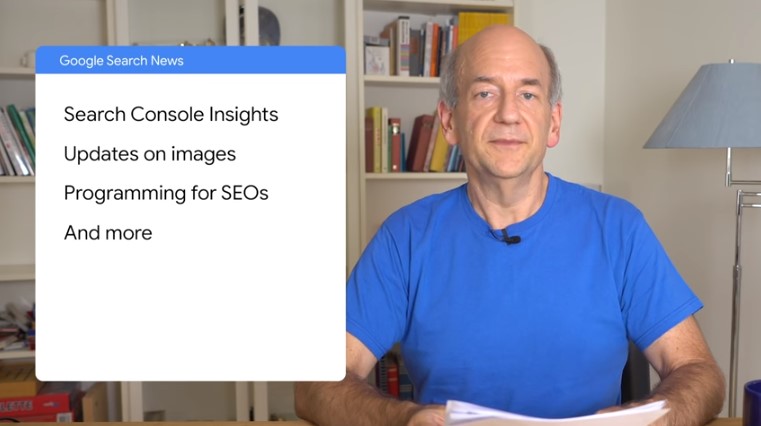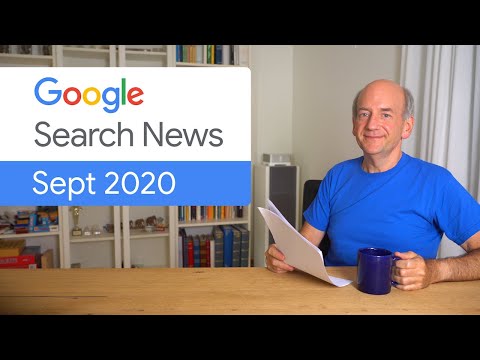September 20 Google Search News, Big G’s latest news
A version of John Mueller still at home from Switzerland (and unusually without glasses) retraces the last months of work of the Google ecosystem and the evolutions taking place in the world of Search: although there were not many launches during the summer, the new September episode of Google Search News is still very rich and tells us how various tools of Big G are changing, like the Search Console, and what news webmasters, publishers and SEO specialists have at their disposal.
Here comes Search Console Insights
The first news on the Google newscast is the launch of a preview of Google Insights, the new tool that combines data from Google Analytics and Google Search Console in an easy-to-understand way for content creators.
The goal of Google Search Console Insights is to help site owners improve their sites in Search and make it easier to track their progress by providing new approaches to sharing insights to enhance visibility in Search.
Using all the features of Google Analytics and GSC can be challenging, even for experts, says Mueller, and “Insights aims to make this much easier, especially for owners of less experienced sites”.
The tool is currently available in preview to a limited number of users for initial testing and at the moment you can not add new sites, but Google “hopes to expand it over time”.
Small updates in Search Console
Even for the GSC itself there are some quick updates, starting with the filter for news added in the Performance Report, which provides information on the performance of news-type content within the News tab in Google Search.
On the structured data front, Google added support for some new types in the rich results test, which now also includes article, critic review and employer rating.
Finally, some time ago support for domains property was added, which gives information for all variants of a domain and makes it easier to see the full picture of the website in Search.
News for images
Mueller then goes on to remember the latest updates related to the complex world of images, kind of resources increasingly central even for the SEO.
In the past few weeks, Google has first started licensable image support, which allows image providers to provide more information about image licensing, which users can read users directly among search results.
Implementation can be done either at the image level, using IPTC Metadata, or on a single page using structured data markups.
Enabling big images in Google Discover
Images in Google Discover can be an important source of clicks, as we said on other occasions, and now you can try to emerge a bit more by enabling the large image preview.
Big G’s Search Relations Lead recalls that Google Discover is a simple, feed-like experience that automatically shows users content related to their interests.
By default, a standard thumbnail of the image may be shown, while larger previews can currently be enabled using AMP pages or the max-image-preview attribute of robot meta tags.
SEO and programming
John Mueller then opens a parenthesis on a topic different from the usual news and talks about a trend that is emerging in recent times: SEO that begin – or return – to look at programming more carefully.
In the early days, many SEOs came from site development, but over the years things have changed a bit; the novelty is that “we are seeing more and more people try Python, a programming language that can also be used within a browser, which can be useful for a variety of SEO tasks and on the site”.
According to Mueller, “you don’t need to know Python to be a good SEO, but it can be useful” and, in general, “understanding any programming language makes it easier to better understand how search engines, web servers, and the internet work, even if you don’t write code often”.
About the SEO in Python various information are available online, and the video specifically mentions Ruth Everett and Hamlet Batista, who regularly publish articles on every aspect, from how to start to the most advanced techniques that use machine learning, with a training course for those who want to approach this system.
News on mobile-first indexing and sitemaps
In the July recap, mention was made to the mobile-first index, and Mueller confirms that Google has decided to move the final date of the switch to the end of March 2021, to give “those remaining sites a little more time to make the appropriate changes”.
In conclusion, there is also an important novelty for sites that use WordPress, as Sitemaps are now part of the WordPress Core: this means that any website that uses WordPress will be able to send a sitemap file by default.
Site maps are widely supported by search engines and help search and indexing new and updated content on the website.






